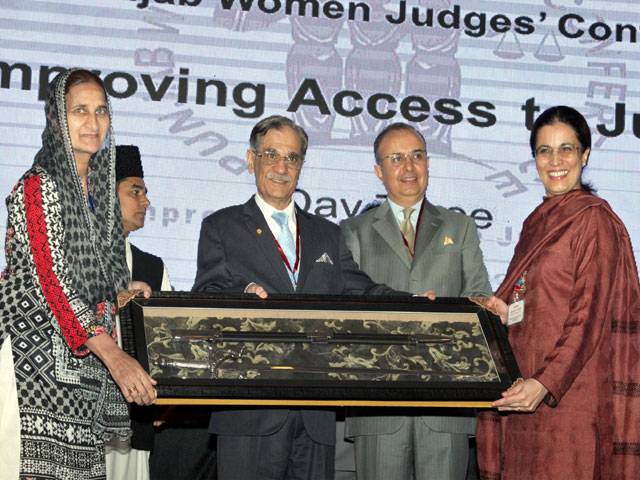LAHORE - Chief Justice of Pakistan Mian Saqib Nisar said on Sunday that in order to meet the demands of justice the judges have to be extra careful while delivering verdicts because decisions made in haste compromise on the principles of justice.
He said a little mistake done by a judge in a decision may take years to reach the Supreme Court and get rectified.
“There will be lesser burden on the superior courts if the lower judiciary performs its duties carefully,” he remarked while addressing concluding session of 2nd Three Day Punjab Women Judges Conference organised by the Punjab Judicial Academy at a local hotel.
The CJP earlier appreciated ADR system and model courts but emphasised that justice must be ensured.
He also laid emphasis on the fundamental rights of women, saying that [in fact] “fundamental rights enshrined in the Constitution make no discrimination in male or female.”
The CJP said they were lucky that they were being governed under a written constitution which guarantees fundamental rights of all the citizens.
He said that women generally may not be getting good treatment in rural areas but the situation was better in cities where they are treated well mostly.
Justice Saqib said there was no difference between a first class civil judge and a Supreme Court judge as both are meant to dispense justice accordingly to the law and no one is permitted to follow his own whims.
He said ADR seems to be a good solution to the problem of delays. Model courts are providing privilege only to those who want it, which was why it should be embraced as it was need of the day.
He advised the judges to know the law and apply it. He said it is a privilege to make the keynote speech at the women judges’ conference.
The CJP congratulated Lahore High Court chief justice for highlighting issues related to Gender Based Violence Cases (GBVCs) and gender sensitivity, and also appreciated the efforts made in conducting courses and trainings to be benefited from rich experience of international speakers.
LHC Chief Justice Syed Mansoor Ali Shah, judges, Registrar Syed Khurshid Anwar Rizvi, District Judiciary Director General Muhammad Akmal Khan, Punjab Judicial Academy DG Mahrukh Aziz and other judicial officers were also present on the occasion.
LHC chief justice in his address said that violence faced by women takes physical, verbal, psychological and economic forms. He encouraged women judges to fight against elements which perpetuate violence against women.
Justice Shah acknowledged the need for better access to justice for women through impartiality in adjudication, and reaffirmed his commitment to equality and non-discrimination for all judges, irrespective of gender.
He also thanked the CJP for sparing time for the conference. He lauded him by saying that the reforms in Lahore High Court and district judiciary could not have been possible without his support.
LHC chief justice also appreciated Justice Ayesha A Malik for organising a second successful conference and thanked the donors – including EU, UNODC, ADB, WB and Asia Foundation – for helping in providing quality justice to the people of the province.
Justice Shah also revealed the figures of the cases decided by the ADR centres and model courts. He said that 3,651 cases have been decided through ADR, 11,113 in Civil Model Courts and 4,274 in Criminal Model Courts.
Justice Ayesha Malik shed light on recommendations put forward by speakers, and she urged women judges to encourage a women-friendly non-discriminatory environment within their courtrooms so that women's faith in the judiciary is restored.
She further stated that policy recommendations which were discussed during the conference would be used to formulate policies for more gender sensitive judicial conduct and environment in courts across the country.
During the Conference, Chairperson of Punjab Commission on the Status of Women (PCSW), Ms Fauzia Viciar apprised participants that in 2016, 7,313 cases of violence against women were reported by the office of the Punjab IGP, 539 of which involved beating.
IAWJ President Justice Susana Medina shared that in Argentina a Domestic Violence Office, which operates 365 days a year, has been established in the Supreme Court and she encouraged Pakistani courts to follow the example.
Eusebia Munuo, Justice of the Court of Appeal in Tanzania, highlighted the fact that economic violence is a major problem faced by widows in rural communities in Tanzania.
Justice Saida Chebili, President of the Court of Sousse in Tunisia, emphasised that barriers faced by women when accessing justice must be overcome through rights based awareness campaigns, and education for the masses.
Participants inquired from the attending experts about ways to protect children during trials involving domestic violence.
Justice Ann Walsh Bradley of the Supreme Court of Wisconsin shared that Children Advocacy centres have been established in their country to provide psychological and other support services, and that Restraining Orders can be obtained for entire families in violent situations.
In a session regarding sexual violence, Mehreen Siddiqi from PCSW revealed that from January to June 2017, 1,365 cases of rape were reported, while data collected by PCSW revealed a staggeringly low conviction rate in rape cases.
ADSJ Mr Shazib Saeed disclosed widespread bias among law-enforcement agencies, which deters women and girls from pursuing proceedings.
Justice Ann Walsh Bradley urged judges to realise the special needs of child witnesses in trials involving sexual violence.
Ms Anne Goldstein and Honourable Justice Eusebia Munuo talked about the lAWIs work to eliminate Sextortion and child sexual abuse in Ghana, and collaboration with medical practitioners, legal professionals, judicial officers, police officers, psychiatrists, religious leaders, and local community leaders to support women who are victims of violence.
Dr Robyn Layton, former Supreme Court Judge in South Australia, spoke about her experience of conducting Gender Sensitivity Trainings with the district and Punjab judiciary. She appreciated the efforts of the Punjab Judicial Academy and the Lahore High Court in collaborating to ensure gender sensitivity among the judiciary.






